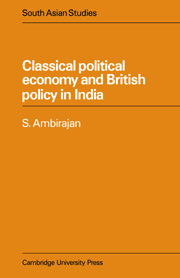Book contents
- Frontmatter
- Contents
- Dedication
- Acknowledgments
- 1 Introduction
- 2 Economic ideas and British policy towards India
- 3 Economic ideas and famine policy
- 4 Economic ideas and economic relations
- 5 Economic ideas and land taxation
- 6 Economic ideas and taxation policies
- 7 Political economy and a policy of economic development
- 8 The state and the policy for economic development
- 9 Conclusion
- Select bibliography
- Index
- Frontmatter
- Contents
- Dedication
- Acknowledgments
- 1 Introduction
- 2 Economic ideas and British policy towards India
- 3 Economic ideas and famine policy
- 4 Economic ideas and economic relations
- 5 Economic ideas and land taxation
- 6 Economic ideas and taxation policies
- 7 Political economy and a policy of economic development
- 8 The state and the policy for economic development
- 9 Conclusion
- Select bibliography
- Index
Summary
The high and loyal principles which actuate all our … officers would, I am fully persuaded, prevent any wilful deviation from the instructions laid down by competent authority. But where theories are strongly held, they often insensibly influence the course of action, and lead unconsciously to interpretations and inferences in accordance with these theories.
Sir William Muir Lieutenant-Governor of North Western Provinces in 1868I was thus in a good position for finding out by practice the mode of putting a thought which gives it easiest admittance into minds not prepared for it by habit; while I became practically conversant with the difficulties of moving bodies of men, the necessities of compromise, the art of sacrificing the non-essential to preserve the essential. I learnt how to obtain the best I could, when I could not obtain everything … to be pleased and encouraged when I could have the smallest part of it.
John Stuart Mill (on what he learnt as an adviser to the East India Company)The theme of this monograph is the baffling area of the relationship between economic ideas and economic policy. The variables are so many, the problems so confused, and the time span so great that it is impossible to give any precise answer to the question: ‘What influence, if any, did economic theory exert on economic policy?’ The theory/policy link is not constant over time, nor is its nature the same in different areas.
- Type
- Chapter
- Information
- Classical Political Economy and British Policy in India , pp. 267 - 276Publisher: Cambridge University PressPrint publication year: 1978



